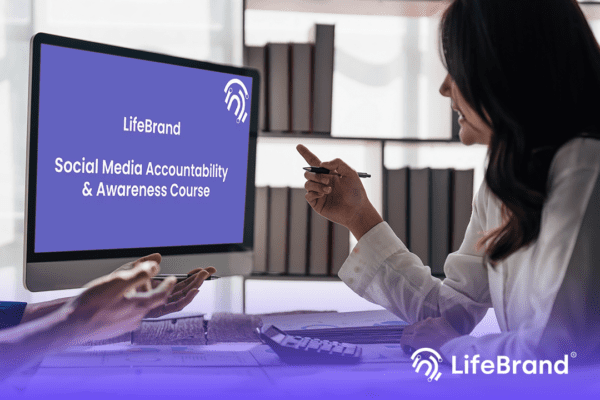Ensuring Compliance Excellence: 5 Compelling Reasons for Internal Social Media Training in the Insurance Industry

Insurance companies are constantly juggling several key needs. They are tasked with navigating complex regulatory landscapes, meeting customer expectations for seamless digital experiences, and ensuring compliance excellence. All while being actively engaged on social media!
Social Media Benefits the Insurance Industry
Today’s tech-savvy consumers seek convenient, personalized experiences across multiple digital touchpoints. It’s because of this, insurance professionals must leverage social media effectively to engage with customers, provide valuable insights, and deliver seamless experiences.
Social media also offers a direct and interactive channel for insurance companies to strengthen customer relationships. By engaging with customers through regular interactions, addressing inquiries, and sharing relevant information, insurance professionals can increase the likelihood of repeat business.
However, without proper training, they may struggle to harness the power of social media or make an unforgivable blunder.
If Used Incorrectly, Social Media Can Cause Harm
Social media platforms have undoubtedly revolutionized the way we communicate and share information. While they offer immense opportunities for engagement and growth, they also present significant risks and challenges for the insurance industry.
One of the primary concerns with social media in the insurance industry is the risk of reputational damage. Social media platforms empower individuals to voice their opinions and experiences publicly, making it easier for customers to share both positive and negative feedback. A single negative post or review can quickly gain traction, potentially tarnishing an insurer’s brand image and eroding customer trust. With the viral nature of social media, misinformation or negative experiences can spread rapidly, amplifying the impact on an insurer’s reputation.
5 Reasons You Need Internal Social Media Training
1. Unplanned Disclosure of Confidential Information
The inadvertent sharing of sensitive or proprietary data can have serious repercussions, including possible violations of privacy laws and potential harm to your company’s reputation. A well-structured social media training program can emphasize the importance of privacy and data protection, providing clear guidelines on what information should never make its way onto public platforms.
2. Brand Damage from Inappropriate Content
Inappropriate comments or posts can swiftly tarnish your company’s hard-earned reputation. Regular training can familiarize your team with the dos and don’ts of online interactions, enabling them to project a professional image that aligns with your organization’s core values and behavioral expectations.
3. Compliance With Industry Regulations
The insurance industry operates within a complex regulatory landscape. Any misstep, even one made unwittingly on social media, can result in severe legal consequences, including hefty fines, sanctions, or even the loss of a business license. By incorporating real-life scenarios and potential pitfalls into the training, companies can better prepare their employees to navigate the regulatory landscape of social media use.
4. Improved Communication and Collaboration
Effective communication and collaboration are paramount for business success. This is particularly true for the insurance industry, where relationships and clear interactions with clients are key components of the service. Social media training provides insights into the subtleties of online interactions, from understanding the nuances of tone and language to leveraging the unique features of each social media platform for optimal engagement.
5. Mitigate Legal Risks
Well-intentioned but ill-advised posts may lead to defamation claims or copyright infringements, with your company facing potential legal action. Training can elucidate legal concerns surrounding social media use, including defamation and copyright laws, thereby minimizing the risk of inadvertent legal infringements.
Reducing risks through effective social media training cannot be overstated. Equipping employees with knowledge on the safe use of social media helps prevent mistakes that could damage the company’s reputation. Which is why appropriate use of social media paves the way for an insurance company to thrive in the digital age.
Leveraging LifeBrand’s Online Training
The easy solution to avoid these potential risks? Social media training!
To ensure that your employees are well-equipped to navigate the social media landscape responsibly, LifeBrand offers the Nationally Accredited “Social Media Accountability and Awareness” (SMAA) online training. This comprehensive e-course is designed to educate participants about the principles and best practices of social media use, emphasizing the impact of their online presence on both personal and employer brands.
LifeBrand’s SMAA online training empowers your employees to navigate social media responsibly, protecting your brand integrity and fostering a culture of compliance. When utilizing it you can mitigate the risk of reputational damage and legal liabilities associated with social media misuse. Take advantage of LifeBrand’s expertise in social media! Together, we can ensure compliance excellence and harness the full potential of social media in the insurance industry!
Create a Social Media Policy
Crafting an effective social media policy is a critical step in safeguarding your firm’s brand reputation and leveraging the power of social media for business growth. At LifeBrand, we understand the complexities involved and have developed a comprehensive Social Media Policy Template for you to customize to your agency’s needs.
Our template serves as a strategic roadmap, providing guidance on maintaining a consistent brand voice and image across various social media platforms. We have incorporated industry-specific considerations and best practices to help you create a policy that is both protective and empowering. With fillable fields, you can personalize the template to align with your company’s unique needs and requirements. Say goodbye to the guesswork and start building a compliant digital culture within your organization today!

